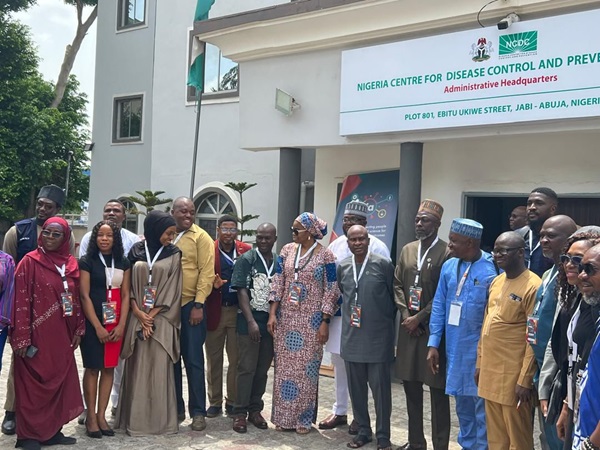
The Nigeria Centre for Disease Control and Prevention (NCDC) emphasises the importance of understanding social determinants of health security and the necessity of a comprehensive strategy involving various stakeholders, including communication experts and academics.
At the opening ceremony of the Track 3 “Field Epidemiology and Infodemic Management” segment of the Media-EIS Fellowship Programme in Abuja, NCDC director-general, Dr Jide Idris stressed the need to address endemic diseases and leverage technology for improved health outcomes.
Idris reflected on persistent issues related to malaria and other endemic diseases, questioning, “If we know when these diseases occur, why are people still dying of malaria at such alarming rates?”
He highlighted the need for a paradigm shift in addressing these health challenges and integrating media practitioners’ expertise for effective solutions.
“The media possess the knowledge we require. It’s crucial to alter our approach for tangible results,” he emphasised.
He also emphasised self-reliance and efficiency in healthcare, emphasising the importance of addressing healthcare system gaps and utilising rewarding technologies.
Recalling an anecdote from 2014 when Nigeria battled Ebola, Idris shared a journalist’s frustration due to poor communication. “With better information, we could have handled it differently,” remarked the journalist.
He advocated for consolidated training programs to enhance health sector effectiveness and expressed optimism about future collaborations. “We can’t do it alone. Collaboration with varied expertise in communication and other domains is essential,” he asserted.
Resident advisor of the Media-EIS Fellowship Programme, Dr Olayinka Umar-Farouk highlighted Nigeria’s numerous infectious disease outbreaks, including avian influenza, Ebola, Mpox, COVID-19, yellow fever, rabies, bovine tuberculosis, measles, rubella, Lassa fever, diphtheria, cholera and meningitis.
Umar-Farouk identified a significant gap in effective science communication, hindering public acceptance of health advisories. “This gap stems from media practitioners’ limited grasp of disease epidemiology, impacting their ability to inform and empower the public,” she stated.
She pointed out that the COVID-19 pandemic highlighted the necessity of disease- and population-centric outbreak responses and the crucial role of media in combatting misinformation.
The MEDIA-EIS Fellowship, developed by NCDC, AFENET and Johns Hopkins Centre for Communication Programmes, aims to train journalists in epidemiology, infodemiology and risk communication.
Resident advisor for the Nigeria Field Epidemiology and Laboratory Training Programme, Dr. Muhammad Balogun emphasised NCDC’s critical role in the programme and the need for continuous training to benefit other journalists.
The MEDIA-EIS Fellowship, comprising over 29 journalists from Nigeria’s six geopolitical zones, aims to enhance journalists’ expertise in public health through comprehensive training in basic epidemiology, infodemiology and social and behaviour change (SBC)/risk communication.
The programme seeks to enhance the success of field epidemiology initiatives and support the prevention, detection and control of disease outbreaks, thereby strengthening Nigeria’s health security.
Fellows will collaborate with mentors in journalism and public health, technical staff from One Health ministries, departments and agencies, and other subject-matter experts.
Participants will access relevant research, technical working groups, key decision-makers and current information to produce media content that influences policy and shapes public perception.
The Fellowship’s goal is to cultivate media professionals who improve the quality of outbreak reporting, ensure accountability and transparency, and promote best practices in finance, equity and human rights during health emergencies.
Trained fellows will advocate for equitable attention to marginalised populations, ensuring fair consideration for all groups in emergency preparedness and response efforts.

